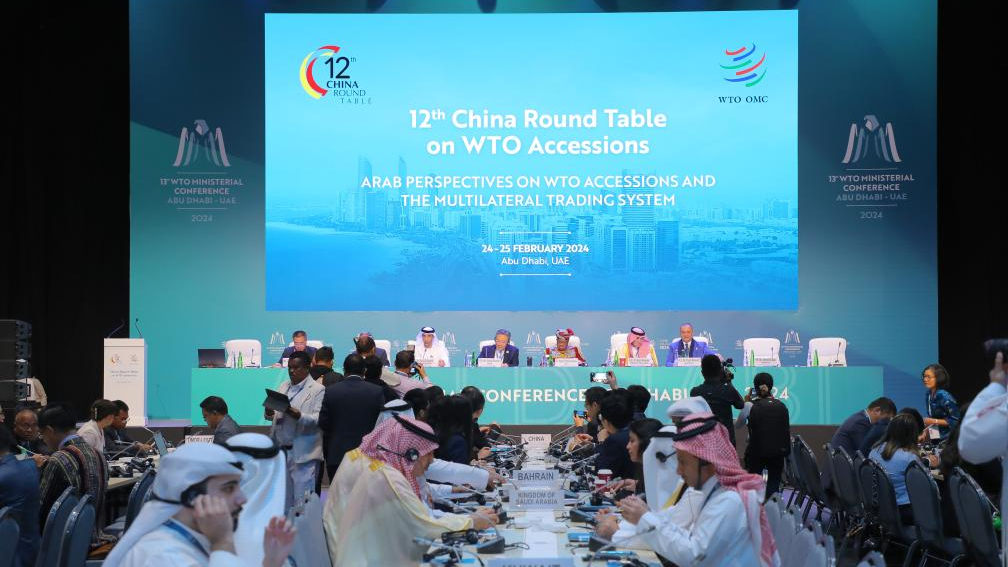
China's Commerce Minister Wang Wentao (L) poses for a photo with WTO Director-General Ngozi Okonjo-Iweala after signing a new Memorandum of Understanding on the China Program during the 12th China Round Table on WTO Accessions held in Abu Dhabi, the United Arab Emirates, February 25, 2024. [Photo/Xinhua]
By Hannan Hussain
China on February 26 has strongly opposed a U.S. report that denies China's contribution to the multilateral trading system and global economy after it acceded to the World Trade Organization (WTO) over two decades ago.
While China as the largest developing WTO member has always firmly supported the multilateral trading system, and earnestly fulfilled its WTO commitments, the U.S. report featured unfounded allegations against China's market economy, its trade policies, as well as baseless assertions against multiyear compliance at the top trade body.
Without question, the United States has itself served as a major source of WTO noncompliance, promoting discriminatory trade policies and unilateralism to the detriment of a more stable, inclusive and reformed multilateral trading system. Plenty suggests that the report is a glaring departure from ground realities.
The United States Trade Representative (USTR) is wrong to allege that China is the source of "many problems created" at the WTO, and that Beijing's record of compliance with WTO obligations "has been poor." Key proof points debunk that conjecture: Beijing has played a pivotal role in concluding negotiations on the Investment Facilitation for Development Agreement. It has also opposed unilateral trade bullying, and has consistently pushed back against major trade barriers, including Washington's Section 301 tariffs on imports from China which were in violation of U.S. commitments under the WTO. Attempts to smear Beijing's track-record of compliance are destined to fall flat, considering institutional and global acknowledgement of China's support for a rules-based multilateral trading system with WTO at its core.

The 12th China Round Table on WTO Accessions held in Abu Dhabi, the United Arab Emirates, February 25, 2024. [Photo/Xinhua]
Conversely, Washington's obsession with getting "tough" on China has positioned it as a major impediment to WTO inclusivity and reform. Remember, it was the United States – not China – that unilaterally struck down WTO's highest court and sought to weaken critical trade dispute procedures to prioritize pressure on self-identified U.S. "rivals." All the while, U.S. sought to insulate itself from any penalties or sanctions.
China's Commerce Ministry is justified in exposing the U.S. report's misrepresentations of China's trade policies and market compliance, refocusing attention on a well-documented reality: The unilateralism and bullying acts of the United States itself. "The U.S. side smeared China's legitimate trade measures as economic coercion, labeled China's response to the U.S. blockade and repression as decoupling, and falsely accused China of causing overcapacity," emphasized the Ministry.
Claims of WTO harm from China's alleged "state-led, non-market" policies are also far away from facts. Washington has been playing up myths about these policies, and alleges that Chinese industries and enterprises are subject to a so-called "artificial competitive advantage." Scores of WTO states simply don't subscribe to the same groundless threat perceptions. Instead, the report shows rising insecurities in Washington about China's development progress, its status as the second largest world economy, and a top WTO trading partner. If toxic allegations of state-led interventions had any basis in fact, presumably other WTO trading partners would've arrived to Washington's conclusion.
That did not happen. Instead, China continues to mirror member states' expectations to steer the WTO towards more practical results, including smooth advancement of a globally-focused dispute settlement mechanism, and putting the rising food security and financing concerns of developing nations at the forefront. Important signs and partnership potential were evident at the recent 13th Ministerial Conference of the WTO in Abu Dhabi.
A truly effective and responsive multilateral trading system has little to gain from U.S. conjecture against China's WTO compliance. The world should be alarmed by U.S. attempts to discriminate against China in battery supply chains, refusal to abide by critical WTO rulings, and sustained politicization of economic and trade issues.
The U.S. report fails to come through on the realities of China's reform leadership at the WTO, including successful efforts to help least developed nations integrate into the multilateral trading ecosystem. Any rules-abiding nation is well within its rights to support legitimate retaliatory measures against illegal tariffs and trade barriers, all to protect the rights of its companies and targeted enterprises. As such, China's calculated responses to U.S. trade and market belligerence have been wrongly projected as "decoupling."
All this demonstrates the extent of distortion in the USTR report, and Washington's firm refusal to reckon with China's genuine WTO support and progression.
Hannan Hussain, a special commentator on current affairs for CGTN, is a foreign affairs commentator and author. He is a Fulbright recipient at the University of Maryland, the U.S., and a former assistant researcher at the Islamabad Policy Research Institute.

 中文
中文



